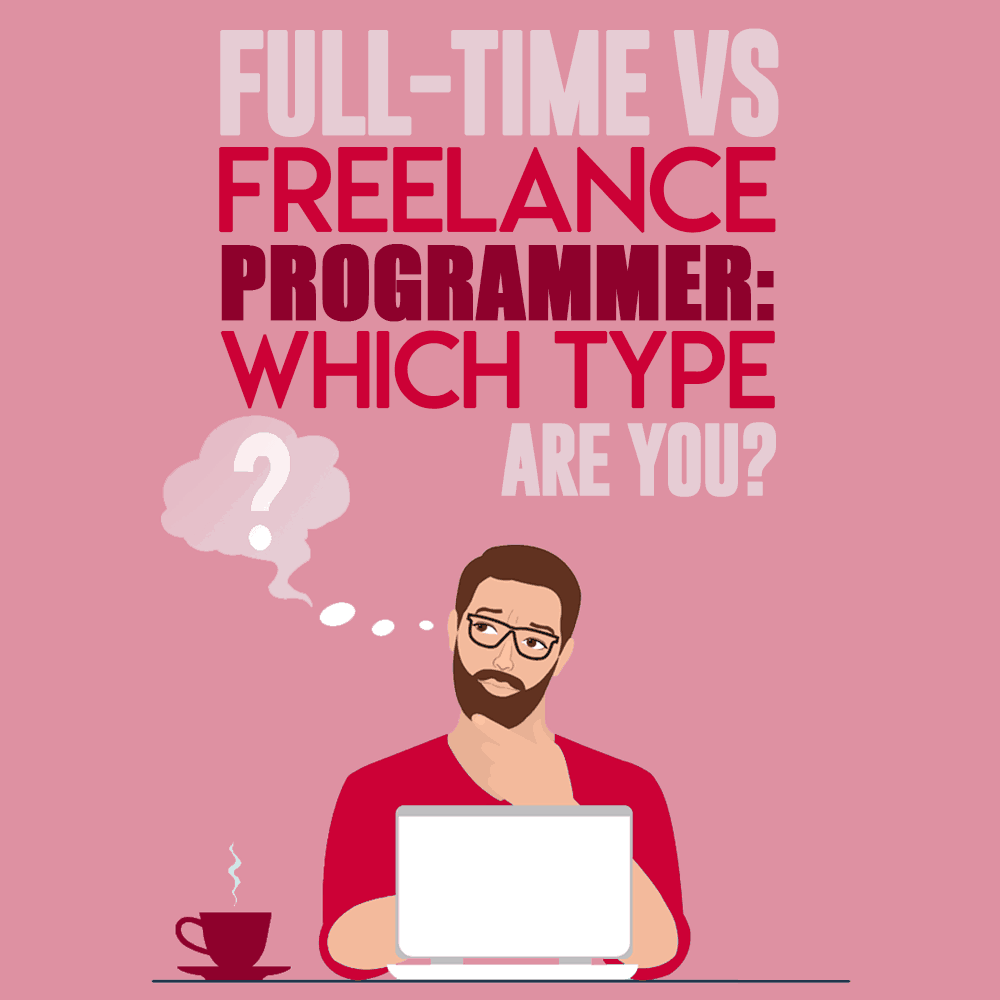
Is a full-time job opportunity a better way of earning a steady income, or do you like the challenges and benefits of freelancing?
To find out what’s best for you, you’ll have to take your character into account, as well as know exactly what you’re getting into.
Freelance and Full-time Programming: What’s the Difference?
Even though similar (if not the same) programming jobs are available through both the full-time and freelance models, there are big differences between the two.
Most programmers who need a job go straight to full-time work. It’s considered a “safe” and “secure” way to earn money. However, even though it seems that way, there’s still always the possibility of getting laid off or fired.
On the other hand, freelancing allows you to work for yourself, work with more clients at once, choose the number of hours you want to put in, and set your own goals (instead of working toward the goals of the company that hired you).
The best way to understand the difference between these two work models is by taking a look at the pros and cons of each:
| Pros | Cons | |
| Full-time |
|
|
| Freelance |
|
|
How To Know Whether Full-time or Freelance Work Is Right for You
Many programmers are attracted to the ability to work whenever and wherever they want. I have seen someone working on their laptop while sipping their favorite cup of coffee in a public café many times, and thought, “That person has the good life”!
As you are aware of by now, both types of programming have their advantages and disadvantages, but your personality will help you find out which type works the best for you.
What Type of Person Are You?
Freelancing might seem fun and easy until you actually try it out for yourself and see that it’s not as simple as it might seem in theory.
Freelancing requires a specific type of person with more drive than average. It requires a person with high self-discipline. Someone who doesn’t procrastinate.
These types of people will, most of the time, value freedom and creativity a lot more than the security of a full-time job.
Even though you can work on yourself and achieve these characteristics, there is another necessary skill that might be harder to achieve. Freelancers are supposed to be quick learners, and that’s something that can’t be as easily learned.
On the other hand, a full-time job still requires discipline, but if you’re not naturally a disciplined person, you’ll most likely become one under the pressure of your boss.
You might not like working long hours, but you’d be okay with it because it’s something most full-time individuals do—and that’s just the way it is.
As an employee, you might not be required to be a quick learner, since you will most likely care more about finishing the hours in your work day than improving aspects that might not get noticed (or feel like they’re done in vain).
But, if you have a strong will and desire, and you’d do anything to quit full-time work, and you’re not just saying it, I believe that you can make it as a freelancer.
Fulltime, Freelance … Why Not a Full-time Freelancer?
Some people see freelancing as a great way to create another stream of income that would go well alongside their full-time salary.
But why not combine both terms and become a full-time freelancer?
This would mean that you’d still work full-time, but instead of working for a company, you’d put all that energy and time into your own business.
You’d work on your own and be fully in charge (and you could even expect to discipline yourself).
Being involved full-time in freelancing comes with risks, as well, but it can be totally worth it.
How To Go Freelance
Every beginner has faced challenges like the fear of the unknown, a lack of confidence, a lack of skills, or fear of the inability to lead a successful freelancing career.
Many people find freelancing to be “too risky,” since most people are already employed and have a sense of “security.” Even though they are guaranteed payment for every week or month they work at the company, they can get fired any day, and there goes the security.
In that sense, freelancing isn’t as risky—but it requires a lot of hard work and self-discipline. Once you get through the beginning stage, you can enjoy the benefits of freelancing that will surpass the benefits of a full-time job.
Everyone can learn new skills, everyone can get their discipline in order, and everyone can work at least 40 hours toward their own goals (everyone’s already working 40 hours for their employers anyway).
Being scared of not making it is out of the question once you become a freelancer. When you become a freelancer, you will put everything you have into it just to make it work. And if you do that, you’ll be successful.
Steps to Becoming a Freelancer
These six steps will have you well on your way to becoming a freelancer.
Define Your Services
Freelancing gives you plenty of opportunity and freedom, including the freedom to choose what services you will provide.
Whether it’s app development, software testing, or cybersecurity, think of the skills you already have and the skills you’d like to learn.
It won’t take long before you have a specific service in mind. And that’s the first step you should take to become a freelancer!
Choose Your Focus
Are you going to be a part-time freelancer or a full-time freelancer? It’s important to be clear with yourself up front and know exactly what you want out of your freelancing journey.
If you are going to do freelance part-time, you might not be under the heavy pressure of full-time freelancing, but you won’t be able to fully invest yourself in your own business.
Decide which path you want to take and ask yourself once again—are you ready to do what it takes to succeed? It will be worth it, I promise!
Set Your Rates
As a freelance programmer, you will need to learn how to determine the worth of your services and your time. You will need to know how to set your rates so you are profitable, no matter the number of hours you put into your business.
Also, you have to account for everything else you will take care of—your own insurance, vacation, equipment, retirement fund, salary, and even utilities (if you work from home).
While it might be tempting to accept any job that comes your way as a freelancer, you should strike a balance between your time and the investment you put into your freelance business and the money you receive in return.
Build Your Own Brand/Portfolio
You’re just a few steps away from marketing yourself, putting yourself out there, and acquiring your first client.
However, before doing that, you need something that will help you sell your services: a portfolio.
It can be a simple website showcasing your work, along with your contact information and ways to reach you.
It’s important to create a portfolio straight away, as this will give you higher chances of being taken seriously by potential clients.
Manage Your Finances
As I mentioned earlier, as a freelancer, you’ll have to take care of your finances.
This means keeping your own books and an accurate income and expenses sheet. We highly recommend tracking the time you’ve spent working, as well.
Later on, as you get established, you’ll be required to pay taxes—or even hire your own accountant (if you get super busy).
For now, a simple sheet or software program will suffice, along with a personal bank account and a couple accounts on the most well-known internet payment platforms for receiving digital payments.
Choose a Good Laptop and Computer

Do your research before buying—sites like NetbookNews are dedicated to helping you find the perfect laptop so you can be reliable for your clients, get work done efficiently, and never worry about your laptop failing you.
Make Your Choice
Working a full-time job you love is a great way to gradually build wealth while having a sense of security and a regular paycheck.
But if you aren’t satisfied with the direction of your career or you want to change industries—or even start working for yourself—freelancing is the best way to do it.
It takes a lot of work and dedication, but you get to work on something you’re passionate about and grow a business that has no limit on earnings. Looking at freelancing in the long run, it’s worth every hour you put into it.

